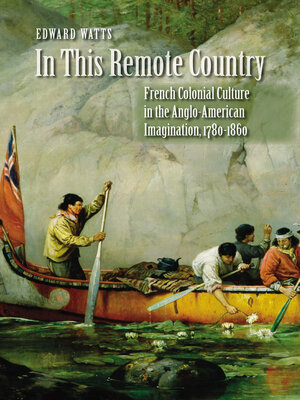In This Remote Country
ebook ∣ French Colonial Culture in the Anglo-American Imagination, 1780-1860
By Edward Watts

Sign up to save your library
With an OverDrive account, you can save your favorite libraries for at-a-glance information about availability. Find out more about OverDrive accounts.
Find this title in Libby, the library reading app by OverDrive.



Search for a digital library with this title
Title found at these libraries:
| Library Name | Distance |
|---|---|
| Loading... |
When Anglo-Americans looked west after the Revolution, they hoped to see a blank slate upon which to build their continental republic. However, French settlers had inhabited the territory stretching from Ohio to Oregon for over a century, blending into Native American networks, economies, and communities. Images of these French settlers saturated nearly every American text concerned with the West. Edward Watts argues that these representations of French colonial culture played a significant role in developing the identity of the new nation.
In regard to land, labor, gender, family, race, and religion, American interpretations of the French frontier became a means of sorting the empire builders from those with a more moderate and contained nation in mind, says Watts. Romantic nationalists such as George Bancroft, Francis Parkman, and Lyman Beecher used the French model to justify the construction of a nascent empire. Alternatively, writers such as Margaret Fuller, Henry Wadsworth Longfellow, and James Hall presented a less aggressive vision of the nation based on the colonial French themselves. By examining how representations of the French shaped these conversations, Watts offers an alternative view of antebellum culture wars.
In regard to land, labor, gender, family, race, and religion, American interpretations of the French frontier became a means of sorting the empire builders from those with a more moderate and contained nation in mind, says Watts. Romantic nationalists such as George Bancroft, Francis Parkman, and Lyman Beecher used the French model to justify the construction of a nascent empire. Alternatively, writers such as Margaret Fuller, Henry Wadsworth Longfellow, and James Hall presented a less aggressive vision of the nation based on the colonial French themselves. By examining how representations of the French shaped these conversations, Watts offers an alternative view of antebellum culture wars.







